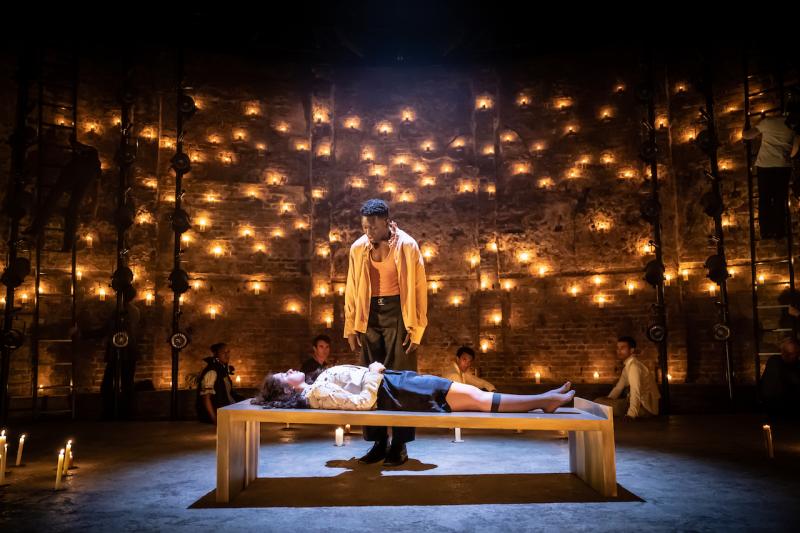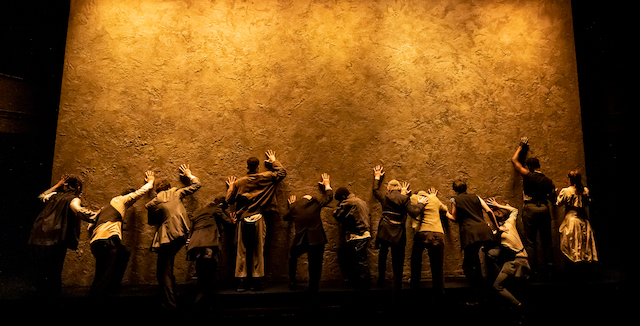Romeo and Juliet, Almeida Theatre review - muscular action interspersed with moments of telling stillness | reviews, news & interviews
Romeo and Juliet, Almeida Theatre review - muscular action interspersed with moments of telling stillness
Romeo and Juliet, Almeida Theatre review - muscular action interspersed with moments of telling stillness
The scenes overlap so that characters are besieged by their past, present and future

Rebecca Frecknall’s Romeo and Juliet burns like ice, paring back and tightening the script so that love and death are constant bedfellows. She underscores her vision with a thrilling, furious physicality, interspersing explosive fight scenes with steely dance sequences heightened by Prokoviev’s immortal Montagues and Capulets.
A Frecknall production these days arrives bearing the weight of high expectations; just whisper the words Summer and Smoke, Cabaret, or A Streetcar Named Desire, and most avid theatregoers will spontaneously combust. At her very best, this powerfully instinctive director creates productions that seem to plug straight into the nervous system, capturing every electrical impulse that drives the characters’ deepest desires.
In the starkly potent opening sequence we don’t hear the prologue: instead it’s projected onto what looks like an impenetrable rockface (pictured below). Half lit human figures push against it, like prisoners trying to get out of a cell; their struggle looks impossible, futile until the moment when the whole rockface tilts over to become the horizontal bedrock of their bleak new world.
Frecknall has deliberately stripped the play of social context; her key innovation has been to edit the play so that scenes overlap, creating moments in which characters are besieged by their past, present and future. Rather than leaving the stage once their scene has finished, actors either freeze or move in slow motion round the central action, becoming ghostly witnesses to the escalating horror.
It’s a daring and effective device: when for instance, Juliet waits impatiently in her bedroom for Romeo to come and consummate their marriage, to her left we see the still twitching corpse of Mercutio. Shortly after when her nurse cries out to Juliet that Romeo is banished, we see Romeo, at that point in Friar Lawrence’s cell, turn his head as if he has it heard it directly from the nurse’s wail of despair. Isis Hainsworth’s Juliet is vivid, petulant, in the moment – a true teen struggling to accept the constrictions of her world. At points she comes across as a child, at others as an adult wise beyond her years. When her father talks to her about younger girls than her becoming mothers, she scrunches up her face in disgust. Yet for the balcony scene, she comes down into the garden and approaches Romeo as an equal, no impossible-to-attain ideal but a young woman striking a connection beyond the boundaries her parents have delineated.
Isis Hainsworth’s Juliet is vivid, petulant, in the moment – a true teen struggling to accept the constrictions of her world. At points she comes across as a child, at others as an adult wise beyond her years. When her father talks to her about younger girls than her becoming mothers, she scrunches up her face in disgust. Yet for the balcony scene, she comes down into the garden and approaches Romeo as an equal, no impossible-to-attain ideal but a young woman striking a connection beyond the boundaries her parents have delineated.
Toheeb Jimoh’s Romeo – of The Power and Ted Lasso fame – exudes a commanding magnetism even as you can sense his hunger to escape the street violence that surrounds him. When he first meets Juliet you can hear his attraction in the woosh of his words. Yet you can also sense the deepening of his fascination from the raptness with which he listens to her. He too sees her as a gateway to a new existence; an apparent way to scale the rockface that confronts them all at the start.
This is a pacy production – two hours from start to finish without an interval – but the muscular action is interspersed with moments of telling stillness. For instance Mercutio’s Queen Mab speech, in which the wild imagery is often heightened by a hyperactive delivery, is recited here with quiet intensity by Jack Riddiford and it’s stronger for it. When Juliet, too, is seized by the horror that Romeo has killed her cousin Tybalt, you really become aware of how her emotions change tempo. After the panic and anger, her rationalism that "that villain cousin would have killed my husband" is delivered with almost meditative quietness, emphasising her stony resolve.
Some critics have given this production five stars and I can understand why. Yet while I admired the startlingly original vision and intensity that marks this out as a great production, I missed the humour with which Shakespeare simultaneously offsets and heightens his tragedy. As Juliet’s nurse Jo McInnes is likeably formidable, but normally her character’s bawdiness is an antidote to the iciness of Juliet’s mother. The humour is a pressure valve – here, and elsewhere, the sense is of a world without joy, in which no character has any chance of escaping their fate.
Even so, this is a radical and visceral take on one of the most difficult works in the canon to illuminate in a new light. In a city where epidemic levels of knife crime continue to take teenage lives, its emphasis on the claustrophobia of cultural violence is significant. At its dark heart, Hainsworth and Jimoh both deliver luminous performances. An important interpretation from one of our most distinctive directors.
rating
Explore topics
Share this article
The future of Arts Journalism
You can stop theartsdesk.com closing!
We urgently need financing to survive. Our fundraising drive has thus far raised £49,000 but we need to reach £100,000 or we will be forced to close. Please contribute here: https://gofund.me/c3f6033d
And if you can forward this information to anyone who might assist, we’d be grateful.

Subscribe to theartsdesk.com
Thank you for continuing to read our work on theartsdesk.com. For unlimited access to every article in its entirety, including our archive of more than 15,000 pieces, we're asking for £5 per month or £40 per year. We feel it's a very good deal, and hope you do too.
To take a subscription now simply click here.
And if you're looking for that extra gift for a friend or family member, why not treat them to a theartsdesk.com gift subscription?
more Theatre
 Mary Page Marlowe, Old Vic review - a starry portrait of a splintered life
Tracy Letts's Off Broadway play makes a shimmeringly powerful London debut
Mary Page Marlowe, Old Vic review - a starry portrait of a splintered life
Tracy Letts's Off Broadway play makes a shimmeringly powerful London debut
 Little Brother, Soho Theatre review - light, bright but emotionally true
This Verity Bargate Award-winning dramedy is entertaining as well as thought provoking
Little Brother, Soho Theatre review - light, bright but emotionally true
This Verity Bargate Award-winning dramedy is entertaining as well as thought provoking
 The Unbelievers, Royal Court Theatre - grimly compelling, powerfully performed
Nick Payne's new play is amongst his best
The Unbelievers, Royal Court Theatre - grimly compelling, powerfully performed
Nick Payne's new play is amongst his best
 The Maids, Donmar Warehouse review - vibrant cast lost in a spectacular-looking fever dream
Kip Williams revises Genet, with little gained in the update except eye-popping visuals
The Maids, Donmar Warehouse review - vibrant cast lost in a spectacular-looking fever dream
Kip Williams revises Genet, with little gained in the update except eye-popping visuals
 Ragdoll, Jermyn Street Theatre review - compelling and emotionally truthful
Katherine Moar returns with a Patty Hearst-inspired follow up to her debut hit 'Farm Hall'
Ragdoll, Jermyn Street Theatre review - compelling and emotionally truthful
Katherine Moar returns with a Patty Hearst-inspired follow up to her debut hit 'Farm Hall'
 Troilus and Cressida, Globe Theatre review - a 'problem play' with added problems
Raucous and carnivalesque, but also ugly and incomprehensible
Troilus and Cressida, Globe Theatre review - a 'problem play' with added problems
Raucous and carnivalesque, but also ugly and incomprehensible
 Clarkston, Trafalgar Theatre review - two lads on a road to nowhere
Netflix star, Joe Locke, is the selling point of a production that needs one
Clarkston, Trafalgar Theatre review - two lads on a road to nowhere
Netflix star, Joe Locke, is the selling point of a production that needs one
 Ghost Stories, Peacock Theatre review - spirited staging but short on scares
Impressive spectacle saves an ageing show in an unsuitable venue
Ghost Stories, Peacock Theatre review - spirited staging but short on scares
Impressive spectacle saves an ageing show in an unsuitable venue
 Hamlet, National Theatre review - turning tragedy to comedy is no joke
Hiran Abeyeskera’s childlike prince falls flat in a mixed production
Hamlet, National Theatre review - turning tragedy to comedy is no joke
Hiran Abeyeskera’s childlike prince falls flat in a mixed production
 Rohtko, Barbican review - postmodern meditation on fake and authentic art is less than the sum of its parts
Łukasz Twarkowski's production dazzles without illuminating
Rohtko, Barbican review - postmodern meditation on fake and authentic art is less than the sum of its parts
Łukasz Twarkowski's production dazzles without illuminating
 Lee, Park Theatre review - Lee Krasner looks back on her life as an artist
Informative and interesting, the play's format limits its potential
Lee, Park Theatre review - Lee Krasner looks back on her life as an artist
Informative and interesting, the play's format limits its potential
 Measure for Measure, RSC, Stratford review - 'problem play' has no problem with relevance
Shakespeare, in this adaptation, is at his most perceptive
Measure for Measure, RSC, Stratford review - 'problem play' has no problem with relevance
Shakespeare, in this adaptation, is at his most perceptive

Add comment